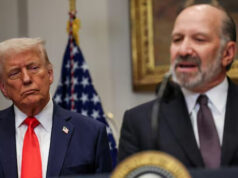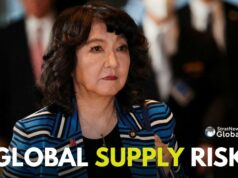The Group of Seven (G7) industrial democracies will investigate methods to use the future income from frozen Russian assets to support Ukraine, according to a draft statement seen by Reuters.
Following Russia’s invasion of Ukraine in February 2022, approximately $300 billion of Russian assets were frozen by the G7 and its allies.
The draft statement mentions progress in discussions about leveraging the extraordinary profits from immobilised Russian sovereign assets to benefit Ukraine.
G7 negotiators have been debating for weeks how to best utilise these assets, which include major currencies and government bonds, predominantly held in European depositories.
The United States has advocated for a loan that could provide Ukraine with up to $50 billion in the near term. However, the cautious language of the statement reflects the numerous legal and technical issues that need to be resolved before such a loan can be issued.
On Saturday, Ukraine’s Finance Minister Serhiy Marchenko will join the G7 finance ministers and central bankers in Stresa, northern Italy. The meeting aims to present funding options for Ukraine to G7 heads of government at a summit in mid-June.
The G7 reaffirmed that Russia’s sovereign assets will remain immobilised until Russia compensates for the damage caused to Ukraine.
Another key topic at the G7 meeting is China’s increasing export strength and industrial overcapacity. The draft statement expresses concern over China’s non-market policies and practices, which the G7 claims undermine their workers, industries, and economic resilience.
The G7 ministers intend to monitor the negative impacts of overcapacity and consider steps to ensure a level playing field, in accordance with World Trade Organization (WTO) principles.
Last week, the United States announced steep tariff hikes on various Chinese imports, including electric vehicle batteries, computer chips, and medical products.
Although the U.S. has not requested its allies to take similar actions, Treasury Secretary Janet Yellen has encouraged the G7 to express strong opposition to China’s industrial and trade policies.
The draft statement also highlights the G7’s goal to finalise the first pillar of an agreement on a global minimum tax rate for multinationals by the end of next month.
This aims to reallocate taxing rights on primarily U.S.-based digital giants, allowing about $200 billion of corporate profits to be taxed in the countries where these companies operate.
The G7 finance leaders reaffirmed their commitment to stable exchange rates, warning against excessively volatile and disorderly currency movements.
This acknowledges Japan’s concerns, allowing it to intervene in the currency market to counter excessive yen fluctuations.
Additionally, the G7 called on Israel to maintain correspondent banking links between Israeli and Palestinian banks to ensure the continuation of vital transactions, trade, and services.
This echoes a warning from U.S. Treasury Secretary Janet Yellen against severing a crucial financial lifeline for the Palestinian territories.
With Inputs From Reuters





